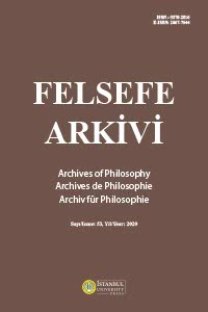Locke’s Account of Liberty in the Essay: Can “Finite intellectual beings” be Free?
Bu makale, Deneme’nin farklı edisyonları boyunca Locke’un
özgürlük anlayışının gelişimini ele almaktadır. Locke’un en temel ahlaki
problemi insanın doğal yetileri ile onun ahlaki ödevlerini, ahlaki ilkelerin
doğuştan geldiğini savunan bir doktrine başvurmadan uzlaştırabilmektir.
Deneme’nin özellikle birinci ve ikinci edisyonları arasındaki farklara odaklanan
bu karşılaştırmalı çalışmanın amacı, Locke’un bu temel ahlaki problemi ile “Güç
Üzerine” adlı bölümde yaptığı revizyonlar arasındaki bağlantıya odaklanmaktır.
Makalede Locke’un güç anlayışı, iradi eylemler ile özgür eylemler arasında
gözetilen fark ve de iradenin belirlenimi sorusuna verilen cevaptaki gelişim
tartışılmaktadır. Son olarak ise, ahlaki özgürlüğün koşulu olarak “arzunun
askıya alınması” ilkesi ele alınır.
Anahtar Kelimeler:
Özgürlük, güç, arzunun askıya alınması, iradi eylemler, iradenin belirlenimi
Locke’s Account of Liberty in the Essay: Can “Finite intellectual beings” be Free?
The article
deals with the evolution of Locke’s idea of liberty from its appearance in the
first edition of the Essay up to its development in later editions. Locke’s
main moral problem is that how the natural abilities of human beings can be
reconciled with their moral duties without referring to the doctrine of
innateness of moral principles. The aim of this comparative study is to focus
on the connection between this moral problem and the changes Locke made in the
chapter “of Power” especially for the second edition. In the article, an
account of the idea of power, of the difference Locke puts between voluntary
actions and free actions are given. Following these, the question of
determination of the will and the development of the answer to this question in
the succession of editions are introduced. Finally the principle of “suspension
of desire” as the condition of moral liberty is discussed.
Keywords:
Liberty, power, suspension of desire, voluntary actions, determination of the will.,
___
- .
- ISSN: 0378-2816
- Başlangıç: 1945
- Yayıncı: İstanbul Üniversitesi
